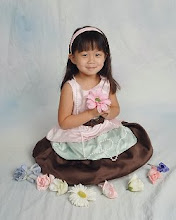
This 10-month-old girl spends her days playing in her walking assisting cart, eating steamed eggs and fruit paste, and examining her toys intently. She claps her hands and kicks her feet when she's happy and likes to imitate the older kids. She has no way of knowing that in just a week all of that -- and the only family she has ever known -- will be gone. She'll be handed to two funny-looking people who speak gibberish and flash lights in her face and feed her awful food and dress her in unfamiliar clothes. They'll have some toys for her, but they aren't the toys she is used to, and although these strangers will be nice to her and try to comfort her, she'll just want her mama -- and her mama is not that woman who's squeezing her so tightly.
As one of our social workers once said, the best day of our lives could be the worst day of hers.
When she's placed in our arms, little Ting Ting might scream in terror. She might arch her back or push us away in a fury. Or she might do just the opposite and sit placidly, not making eye contact, and maybe sleeping for hours at a time to just tune us out. She might refuse to eat. She could prefer one of us over the other and get agitated when that parent leaves her sight for any reason. Or she might seem to be a really happy baby the first few weeks only to experience night terrors after we get home.
Any of those reactions would be normal. And, as strange as this might sound, we'd welcome any of them, because they are signs that she had "attached" to her foster family and is grieving their loss. That also means that she should be able to form an attachment with us, too, in time.
Attachment is essential. A baby who doesn't form proper attachments will grow up feeling the world is not a safe place and will not learn to trust people. She might have difficulty learning because certain parts of her brain are underdeveloped. Her social and emotional development will be impaired. She won't be able to form lasting relationships as an adult.
(You can read more about attachment at these sites: www.a4everfamily.org and attach-china.org).

I'm sharing this information now so you will understand why we'll be doing some things that might seem to you to be overprotective when we first get home. Rachel will probably be taking a bottle for months longer than you think she should. We will avoid crowds and keep her home with just us for awhile. If she cries at night, one of us will immediately be at her side. We will limit visitors, and we might not let anyone else even hold her for a month or two after we get home.
I can see you all rolling your eyes right now. Some of you are even saying, "Oh, please -- you'd think nobody ever had a baby before!"
But the fact is that Rachel Shu-Ting might need for us to treat her more like an infant at first so she can regress a bit and build a healthy attachment. We're fortunate that she's so young and that she spent her first months in a foster home rather than in an institution; both those factors will help the process. But at first, Lance or I will be providing all of her day-to-day care: feeding, bathing, diapering, comforting.
We'll take our cues from Ting Ting, and you'll need to trust us to know when she's ready to face the world at large. In the meantime, please feel welcome to visit us, but only in small groups. You can play with her while one of us holds her or sits behind her. You can tickle her and talk silly to her and hand her toys. You could run an errand or two for us if you want to help.
But you're not changing a single diaper, no matter how much you beg.




No comments:
Post a Comment